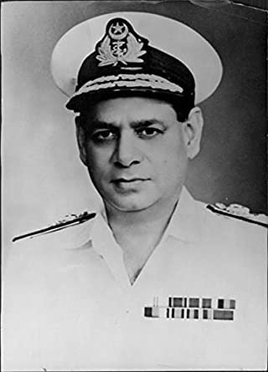Muzaffar Hassan facts for kids
Quick facts for kids
Vice Admiral
Muzaffar Hassan
|
|
|---|---|
| مظفر حسن | |
 |
|
| Commander-in-Chief of the Pakistan Navy | |
| In office 1 September 1969 – 22 December 1971 |
|
| President | Yahya Khan Zulfikar Ali Bhutto |
| Vice President | Nurul Amin |
| Preceded by | Syed Mohammad Ahsan |
| Succeeded by | Hasan Hafeez Ahmed |
| Personal details | |
| Born |
Muzaffar Hassan
1920 Lucknow, Uttar Pradesh, British Indian Empire Present-day India |
| Died | 2012 (aged 91–92) Karachi, Sindh, Pakistan |
| Citizenship | British Subject (1920–1947) Pakistan (1947–2012) |
| Awards | |
| Military service | |
| Branch/service | |
| Years of service | 1941–71 |
| Rank | |
| Unit | Navy Executive Branch S/No. PN. 073 |
| Commands | Western Naval Command Commander Karachi (COMKAR) |
| Battles/wars | World War II
Indo-Pakistani War of 1965
|
Vice Admiral Muzaffar Hassan (born 1920 – died 24 May 2012) was a very important admiral in the Pakistan Navy. He was the last Commander-in-Chief of the Pakistan Navy from 1969 to 1972. He served under two presidents, Yahya Khan and Zulfikar Ali Bhutto.
He is known for leading the Pakistan Navy during the Indo-Pakistani War of 1971. After the war, he was removed from his position. This happened because of findings from a special investigation called the Hamoodur Rahman Commission. Other military leaders, like Lieutenant-General Gul Hassan Khan from the army and Air Marshal Abdul Rahim Khan from the air force, were also removed. Vice Admiral Hasan Hafeez Ahmed took over his role.
Contents
Muzaffar Hassan was born in 1920 in Lucknow, which was then part of British India. Not much is known about his early childhood. Most information comes from books about the military history of India and Pakistan.
After studying at the Rashtriya Indian Military College, he joined the Royal Indian Navy in 1941. He started as a Midshipman, which is a junior officer rank. He fought in World War II in Europe as part of the Royal Indian Navy.
After the war ended in 1945, he went to the Britannia Royal Naval College for more training. He then became a Lieutenant in the Royal Indian Navy.
In 1947, when British India was divided, Muzaffar Hassan chose to join Pakistan. He was one of the first 20 naval officers to join the new Royal Pakistan Navy. He was also a talented hockey player and led the navy's hockey team.
Rising Through the Ranks
In 1952, he was promoted to Commander. He commanded a destroyer ship called the PNS Tughril. He even went on a Hajj mission to Mecca, Saudi Arabia, with the Governor of Punjab.
His career continued to grow. In 1965, he became a Rear-Admiral after taking part in the Indo-Pakistani War of 1965 against India.
In 1967, Muzaffar Hassan became the Commander of the Pakistan Navy Western Command. He also became the Commander Karachi (COMKAR) in 1968. These were important leadership roles.
In 1969, he was chosen to lead the entire Pakistan Navy as its Commander-in-Chief. He visited East Pakistan often to check on the navy's readiness. He also worked as a military advisor for the Southeast Asia Treaty Organization (SEATO).
The 1971 War
In 1971, he led the Pakistan Navy during the war against the Indian Navy. The war had a very difficult impact on the Pakistan Navy. Many warships were lost near Karachi, and the navy did not get enough air support.
The main navy headquarters in Karachi was heavily attacked. The navy lost many personnel, with 408 people dying at sea. About 3,000 naval personnel, including 1,300 officers, became prisoners of war.
Muzaffar Hassan wanted to fight back against the Indian Navy. However, his requests were reportedly turned down by the Air Force chief.
After the War
After the war, on 22 December 1971, Muzaffar Hassan was removed from his military service. The chiefs of the army and air force were also removed. On 3 March 1972, they were officially retired from their positions.
Later Life and Legacy
After leaving the military, Muzaffar Hassan lived in Karachi. He became the first president of the Defence Society Residents Association (DSRA) from 1981 to 1990. This was a local community group.
He rarely spoke to the media about the events of 1971. He passed away on 24 June 2012, at the age of 92, after a long illness. He was buried in the Karachi War Cemetery.
 | Ernest Everett Just |
 | Mary Jackson |
 | Emmett Chappelle |
 | Marie Maynard Daly |

